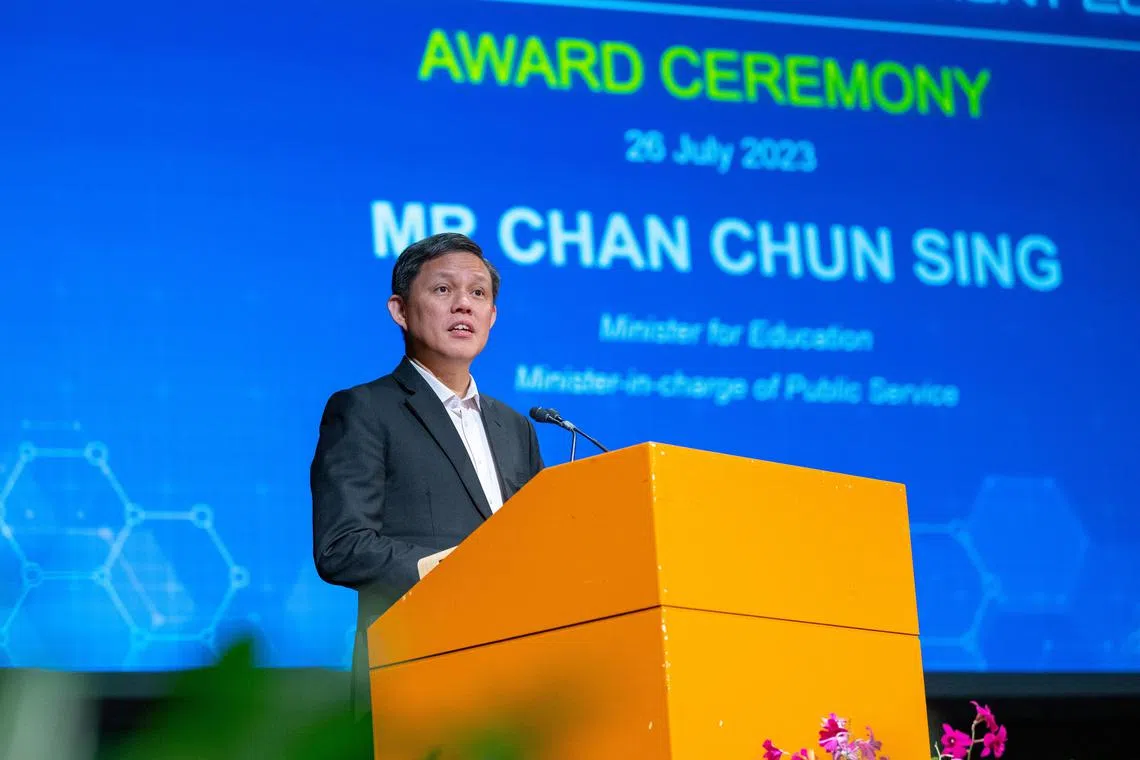MOE’s engineering and tech scholarship attracts more than 500 applicants in first year
Sign up now: Get ST's newsletters delivered to your inbox

The first batch of 200 recipients received the Engineering and Tech Programme Scholarship from Education Minister Chan Chun Sing on Wednesday.
PHOTO: MOE
SINGAPORE - More than 500 pre-university students applied for an inaugural scholarship by the Ministry of Education (MOE) to build a pipeline of talent for careers related to engineering and science.
The first batch of 200 recipients received the Engineering and Tech Programme Scholarship from Education Minister Chan Chun Sing on Wednesday.
“Engineering and science is very crucial to us as a country. The quality of our lives and the kind of economic opportunities that we have going forward will very much depend on the quality of our science and technology and engineering capabilities,” he said.
In a speech at the event held at the National University of Singapore (NUS), Mr Chan said MOE’s selection process for the scholarship was “also quite novel”, as it did not just consider students’ academic abilities.
“We are looking for students with a deep passion for science and engineering. We want people who are not just good with theories and abstract concepts. We also want students who have passion, creativity, gumption to try something new, to build something, tinker with something, improve something,” he said.
“So, unlike one-on-one interviews in usual scholarship interview formats, the shortlisted students were placed in groups to discuss problems and explore solutions, because we also want students from diverse backgrounds to come together to bring their different disciplines to solve emerging problems. These are the qualities that we want to see in our students.”
The two-year scholarship covers school fees, capped annually at $2,400, and provides a yearly allowance of $1,000, which can be spent on items such as school books.
First-year junior college students can apply, while Millennia Institute students taking the three-year programme should do so in their second year. Students taking International Baccalaureate programmes and those enrolled in the NUS High School of Math and Science are also eligible.
Mr Chan encouraged students to help solve some of Singapore’s challenges, including becoming a carbon-neutral country and making use of its space to keep improving people’s quality of life and economic opportunities.
“Today, almost 100 per cent of our energy sources come from fossil fuels. Renewables, in the form of solar energy, form only a few percentage points of our energy sources. How can we break free from the carbon constraints for us to have a higher quality of life and more economic opportunities that are not constrained by our carbon budget?” he said.
“How can we continue to improve our quality of life, build better flats for our people, have more industries within this space of about 1,000 sq km of two-dimensional land and sea space, but with unlimited height or depth space?”
Another challenge is to use Singapore’s science, engineering and technological capabilities to make it more relevant to the world, said Mr Chan. “It’s a continuous process for us to keep thinking of what new ideas we can have to produce things that are of relevance and value to the world, that make us hard to displace.
“Science and engineering will be fundamental to our quality of life and our livelihoods, now and forever. We hope that you will always retain the strong fundamentals that you have built up, be bold to tinker and explore, be bold to collaborate beyond the conventional disciplines.”



